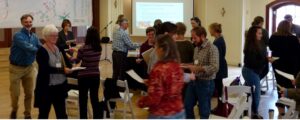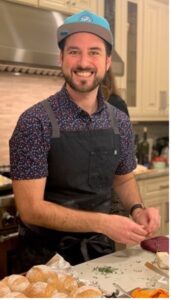By Jason Gershowitz

It can be difficult to describe our work—the field of conflict. When asked questions regarding my career and work, I have referred to my role in more ways than I can count. There are the classic terms of “facilitator” and “mediator,” which are probably the most common words in describing our field. However, there are the other descriptors thriving in my professional vocabulary—terms like process engineer, digital engagement strategist, decision-support advisor, consensus builder, conflict manager, or bridge builder. Plus, there are more tailored titles and/or responsibilities based on a specific project space or problem.
Regardless of language and descriptions, I personally am a “moth drawn to the flame.” The more complex the problem, the hotter the conflict, the more I feel a calling to help. I am drawn to opportunities where I can dive into a problem space to explore each individual thread and the connective tissue with other individuals and/or organizations. And then, I step back to see, to support, to facilitate as the whole fabric comes together and evolves.
Get notified when new articles are posted to the EDR blog – sign up for our email list »
This fascination with seeing the connective tissue is at the core of who I am as a “facilitator.” I don’t think I am alone in this as many friends and colleagues, who are embedded in all different kinds of organizations, are driven in similar ways. This core facilitation drive aligns and reverberates with a wide range of specializations or subject matter expertise—from data science to social media marketing to supply chain analysis and beyond. I strongly suspect that a combination of specializations—with passion for the connective tissue—will lead to “us” (where we are sometimes known as “mediators” and/or “facilitators”) calling ourselves all kinds of different things. In fact, it is paramount that we explore this, especially in recruiting new voices into our spaces and supporting emerging leadership. We must not forget or understate the professional development challenge here: that it is difficult to get hired as a facilitator without facilitation experience and that it is also difficult to get facilitation experience without getting hired. Being open to the marriages of specialization that have foundational collaborative principles (my “connective tissue”) is essential.
As the world becomes increasingly complex and new voices enter our practices, I propose we listen and explore new framing for not only how we do what we do, but how we talk about it. The “how” we as practitioners do what we do is fundamentally grounded; the what and where we do it, and how we talk about that, is rapidly changing. Individuals and organizations will need to increase our collaboration together and across our practices to meet the demands of the changing world, which includes different kinds of “on ramps” into “the field” along with different characterizations of exactly what it means to do this work.
I hope to participate in many more discussions about “what” we do and stay sharp about why it is important to us as individual practitioners and also within our respective organizations. May we all find ways to elevate the skills and interests that energize us and present opportunities for our communities to advance their progress. Whether it’s a water utility rate study or a national-level dialogue on energy systems, we have work to do. No matter what we want to call it.
 Jason Gershowitz is a Principal and Senior Facilitator who lead’s Kearns & West’s DC Regional Team, Digital Engagement practice, and co-leads Collaborative Solutions work in the Energy, Marine, Natural Resources, and Water sectors. Jason brings a background in stakeholder engagement, facilitation, strategy, digital engagement, communications planning and execution, multi-party processes, and training. Jason has a deep understanding of complex technologies that support effective communications and enhance collaboration at all levels. He applies this understanding to analyze community and stakeholder interests, to provide nuanced process designs and recommendations that effectively communicate technical information and alternative perspectives to a wide range of interests while catalyzing growth. Jason works across different kinds of processes from public involvement work to informing regulatory processes to collaborative and agreement-seeking activities. Jason is energized by highly complex projects that require careful attention to people, process, and technical subject matter. Jason is a devoted father to two growing young kiddos and loves spending time preparing meals to share with friends and family.
Jason Gershowitz is a Principal and Senior Facilitator who lead’s Kearns & West’s DC Regional Team, Digital Engagement practice, and co-leads Collaborative Solutions work in the Energy, Marine, Natural Resources, and Water sectors. Jason brings a background in stakeholder engagement, facilitation, strategy, digital engagement, communications planning and execution, multi-party processes, and training. Jason has a deep understanding of complex technologies that support effective communications and enhance collaboration at all levels. He applies this understanding to analyze community and stakeholder interests, to provide nuanced process designs and recommendations that effectively communicate technical information and alternative perspectives to a wide range of interests while catalyzing growth. Jason works across different kinds of processes from public involvement work to informing regulatory processes to collaborative and agreement-seeking activities. Jason is energized by highly complex projects that require careful attention to people, process, and technical subject matter. Jason is a devoted father to two growing young kiddos and loves spending time preparing meals to share with friends and family.
